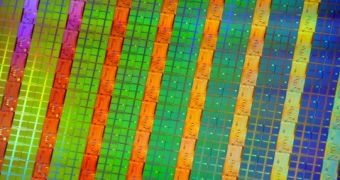The leading chip manufacturers on the Japanese market, Toshiba and Nec have recently announced their joint project to develop competitive 32-nanometer chip in order to maintain a tight competition on the chips market.
This would not be the first partnership between the two semiconductor industry giants, as they have been working closely to achieve 45nm process technology development since February 2006. The 32 nanometer project will work as an extension of the previous partnership at the same location, namely Toshiba's Advanced Microelectronics Center in Yokohama. The companies have teamed up to share the amount of work as well as production costs.
The chip industry is struggling to shrink the actual circuit sizes in order to keep low costs per chip and to provide electronic equipment with an increased functioning time when using batteries. These objectives, however, have impact over materials and the whole production process, which translates into huge investments for starting mass production. Global semiconductor companies fight these costs by creating joint ventures, just like Toshiba and Nec.
The competition is harsh, as Samsung Electronics, IBM, Chartered Semiconductor Manufacturing, Infineon Technologies, STMicroelectronics and Freescale Semiconductor have announced that they are working on achieving the 32-nanometer chips until 2010.
The joint venture will start producing 45-nanometer or 40-nanometer chips until 2009, and will try to add Fujitsu as partner. However, spokesman Etsuro Yamada declined to comment on whether or not Fujitsu would join the group, but managed to say that Fujitsu was taking into consideration all the aspects of adhering to the joint venture.
Producing 32-nanometer chips will require a complete change in the companies' equipments, such as immersion steppers that use purified water, silicon wafers to draw the circuitry over microchips as well as other logistic changes. The companies would have to invest more than 100-200 billion yen before they are able to produce the first 32-nanometer chip.

 14 DAY TRIAL //
14 DAY TRIAL //